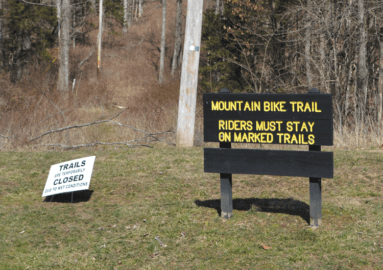Local biking group gets $200,000 grant for trail project at VSP

TALI CROWE PHOTO
More miles of trails will be created at the Versailles State Park for mountain bikers and pedestrians thanks to a $200,000 Next Level Trails Grant from the Indiana Department of Natural Resources.
Governor Eric Holcomb and Indiana Department of Natural Resources Director Bob Bortner announced Thursday the second round of grant recipients for this state program after a long delay in decision-making caused by uncertainty with the COVID-19 pandemic. The grant award coming to Ripley County for the 8-mile-long trail addition in Versailles is thanks to the work done by the Southeastern Indiana Mountain Bike Association (SIMBA), a local trail riding group based at VSP.
“I’m very optimistic and very excited about it, but this has taken us a long time to get to this point,” said Tim Weber, executive director of SIMBA. The group submitted the grant application in November of 2019 after working with the local park staff and with the Town of Versailles to complete all the necessary paperwork and plans for the grant.
The first section of the trail to be completed for this project will be a connector trail to create a safe path for pedestrians and cyclists to get from the town to the park without having to use a car and the state highway.
Holcomb and Bortner both noted in a press conference last week that one of the goals of the Next Levels Trails program is to create connections in communities and regions throughout the state.
“This project has been a couple years in the making. We’re very grateful for SIMBA’s guidance and leadership on the project, and so thankful for state funding,” said Holly Harley, Main Street Versailles president. “The state park is such an asset to our community, and we hope the connector trail helps more visitors make their way into Versailles to check out our beautiful town and patronize our local businesses.”
Weber explained that SIMBA’s planned addition will extend the existing mountain biking trails west of Cedar Creek into the Hassmer Hills area. The mountain bike portion of the new trail will be nearly all of the 8-mile project’s length at more than 7 miles to bring it to the connector portion.
Members of the biking group will walk the mapped addition with the state’s new ecologist in May before breaking ground on the project, Weber explained. Their goal is to have the connector portion of the trail done by the end of 2021, but, as with any construction project, timelines can change because of several factors.
The timing of this two-part project will depend on the schedule of which professional trail builder they hire, but Weber is optimistic they will find someone that could fit the connector portion in this year since it is a small project in comparison to others.
Amy Marisavljevic with IDNR, who mountain bikes herself, described the bike trails as more contoured than pedestrian-only trails to take more advantage of the natural topography of an area. The topography—steepness and grade—of some trails can change the difficulty, which is a challenge area for the connector portion of the coming Hassmer Hills Trail, said Weber. Part of the work done on the connector trail will be grading the hill at the edge of Versailles to five degrees. This will help make the area more friendly to those on foot and on bike.
The Hassmer Hills Trail will bring the total mountain bike trails to just over 30 miles. Weber explained that 30 miles is a sweet spot for mountain bikers as it is enough for solo riders and groups alike to plan a two-day ride with an overnight stay at the park or in nearby lodging.
Fundraising for Local Match
“We (SIMBA) have a pretty health bank account, but we still have to maintain 24 miles of trail,” said Weber, who works alongside the other members of the riding group to clear and patch up areas of trail. “The majority of our funds come from our annual Hassmer Fest fundraiser each September at the park.”
The volunteer riding group is looking for community partners to help them meet the $50,000 local match for the project. They will be able to meet some of this with volunteer hours since the group owns much of the equipment needed to build trails and their members are trained on how to use them, but the group is hopeful area businesses and individuals will support the project with donations. Tax deductible donations can be mailed to SIMBA, PO Box 321, Aurora, IN 47011.
“We had two million more visitors to our state park last year during a global pandemic, just proving that people are excited to get outside,” according to Holcomb.
Holcomb and Bortner are hopeful that the trails projects taking place throughout the state with the support of the Next Level Trails project improve the quality of life for residents and help generate tourism dollars from visitors for more rural regions.

